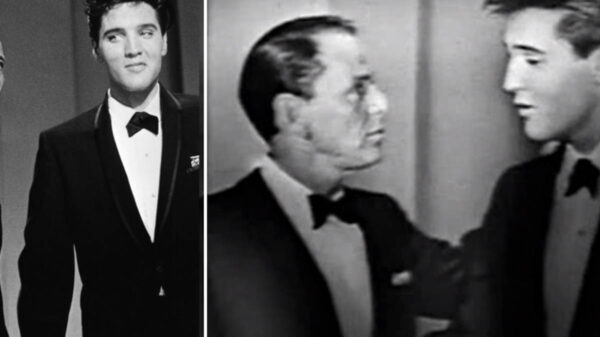If advertisements for the new film Priscilla seem familiar, you’re not the only one.
Just last year, Elvis, a biopic directed by Baz Luhrmann, brought the iconic rock star back into the limelight.
Now, director Sofia Coppola (Lost in Translation, Marie Antoinette) presents an alternative perspective in Priscilla, focusing on the story through the eyes of his first and only wife.
Inspired by Priscilla Presley’s 1985 memoir Elvis and Me, Priscilla captures intimate conversations rather than the grand spectacle of Elvis’s performances—the rights to his music were not obtained from the estate that manages his assets.
The film features Cailee Spaeny as Priscilla and Jacob Elordi as the captivating yet complex Elvis.
This new portrayal invites audiences to question their perceptions of the controversial relationship, which began when Priscilla was just 14 years old, while Elvis, at 24, was already an international superstar.
Their relationship evolved until they eventually married and welcomed their only child, Lisa Marie Presley, in a narrative marked by both affection and turmoil.
How did their courtship, now viewed as inappropriate by contemporary standards, unfold? What unique lens does Coppola provide on their tumultuous six-year marriage?
And why does Priscilla continue to speak positively of her ex? This article aims to answer your burning questions about Elvis and Priscilla’s relationship, using insights from interviews and other sources regarding their romance.
How Did Elvis and Priscilla’s Paths Cross?
The unlikely backdrop for Elvis and Priscilla’s meeting was 1950s Germany.
At that time, Elvis was stationed in Wiesbaden while Priscilla’s Air Force stepfather was based there.
As a young girl, she had been aware of Elvis, having listened to his debut record when she was just 11 years old while her family was in Texas.
“Three years later, 5,500 miles away, I would meet him,” Priscilla reflected in a 1985 essay for People.
Their initial encounter occurred at a party in 1959, where Priscilla was invited by another soldier.
After gaining approval from her stepfather, she met Elvis at his home in Bad Nauheim, dressed in a navy-and-white sailor outfit.
Reacting to her youthful admission of being in ninth grade, Elvis charmingly remarked, “Why, you’re just a baby.” He entertained guests by singing various songs, captivating Priscilla with his incredible voice.
“It started out really with his voice,” she recalled in a 2017 Today interview.
“When he sang, it felt personal.”
Despite the apparent inappropriateness of their courtship, Priscilla reflects back on that time with warmth, asserting, “It was a different time. I wanted to please him, fit in, and discover what he liked.”
Their Marriage and Its Downfall
Eventually, Priscilla graduated from high school, but she later admitted that her studies felt trivial compared to the glamorous life at Graceland.
Elvis heavily influenced her life choices, shaping her appearance, music preferences, and even her thoughts.
He expressed a preference for “soft-spoken brunettes with blue eyes,” and Priscilla transformed herself to fit that mold.
He insisted she dye her hair black to match his own, asserting that “Blue is your color” and dismissing prints as unflattering for her.
Priscilla maintained her virginity until marriage, feeling a strong obligation to comply with Elvis’s expectations.
In Las Vegas in 1967, after a year-long engagement, they wed—a decision heavily influenced by Colonel Tom Parker, Elvis’s manager.
Priscilla stated in a 1972 Ladies Home Journal interview, “At that time, it wasn’t nice for people to live together.”
However, the marriage soon devolved into turmoil, as depicted in Priscilla.
Elvis’s infidelity was evident, and he asked for a temporary separation while Priscilla was pregnant with their daughter.
Lisa Marie was born just nine months after their nuptials.
Priscilla continued to experience emotional challenges post-baby; despite reconciliation attempts, Elvis displayed a reluctance to be intimate with her. This went of for several years!
She recounted feeling unloved, recalling, “I [was] beginning to doubt my own sexuality as a woman.”
“My physical and emotional needs were unfulfilled.”
She went on to have a short fling with her dance teacher and then had an affair with her karate teacher Mike Stone.
Elvis’s good friend Sonny West previously explained why the King had such a difficult time with Priscilla after Lisa Marie’s birth.
He said: “It didn’t come easy for Elvis to be a committed husband. Elvis viewed her as a mother first and a wife second, and he had hang-ups about making love with her.”
And it was because of the relationship Elvis had with his mother Gladys.
Sonny said: “She gave him so much love and attention when he was growing up that he came to put all mothers on a special pedestal.
“The idea of sex with a mother was, to Elvis, out of the question.”
Elvis’s struggles with drug abuse also had lasting effects on their relationship.
During her high school years, Priscilla was introduced to various pills—those to keep her awake during the day and also those to help her rest at night.
In Coppola’s film, her descent into addiction is symbolized as she begins mirroring his reliance on drugs.
While the film’s conclusion may emphasize Elvis’s drug-induced withdrawal as the marriage’s demise, Priscilla cites mutual infidelity and growing emotional distance after she gained independence as the core reasons for their separation.
“When you’re in the entertainment business, there’s always that [temptation]”, she shared in a 2017 interview.
Eventually, she embarked on an affair of her own with karate instructor Mike Stone during the early 1970s.
As Priscilla’s quest for self-identity intensified, she articulated during a 2016 Loose Women segment, “You obviously didn’t have your own life. You lived his life.”
Even after leaving the marriage—famously marked by her driving away from Graceland to the tune of a Dolly Parton song—Priscilla still found a way to stay friends with Elvis as they co-parented Lisa Marie.
When news broke of Elvis’s untimely death at 42 in 1977, Priscilla was devastated.
“I wanted to die,” she confessed.
Priscilla’s Interpretation of Their Story
Coppola’s film remains loyal to the essence of Priscilla Presley’s memoir and her reflections over time.
Given that Elvis passed away in the 70s, he cannot advocate for himself.
Coppola effectively highlights the limitations of this perspective through artistic choices in the film.
The opening sequence features close-ups of Priscilla applying makeup and sinking her feet into plush carpeting, all set against an upbeat 1980 Ramones cover of the Ronettes’ “Baby, I Love You.” Young Priscilla, caught in a cycle of boredom, yearns for awakening.
Cailee Spaeny convincingly embodies Priscilla as both a naive adolescent and a disillusioned young woman grappling with celebrity life.
Jacob Elordi’s portrayal of Elvis balances charm and menace, a duality emphasized by their physical height difference, underscoring the constant power imbalance in their relationship.
Elvis bursts into scenes either seductively or with explosive rage, as demonstrated when he throws a chair near Priscilla’s head during an argument about his music.
Coppola’s keen eye for details captures Priscilla’s external persona shaped by societal expectations—exemplified by the meticulous hours spent on her appearance, accentuated by pastel colors and layered with the pressures of maintaining an image.
Despite the outwardly appealing lifestyle, Priscilla feels trapped.
“It’s me or career,” Elvis makes harshly clear in a phone call when she hints at wanting a part-time job.
Her frequent gazes out of Graceland’s windows encapsulate her external beauty and profound sadness.
Some narratives, such as the identity of her stepfather and the existence of her brother, are omitted—presumably for time.
Yet, the subtle emotional layers remain powerful.
In a poignant early scene, her stepfather lovingly embraces Priscilla, signifying the loss and heartbreak of transitioning from their family setting to a life intertwined with a rock star.
As Coppola deepens her focus on these intricacies, she artfully conveys the profound heartbreak intertwined with Priscilla’s journey.
Read more



